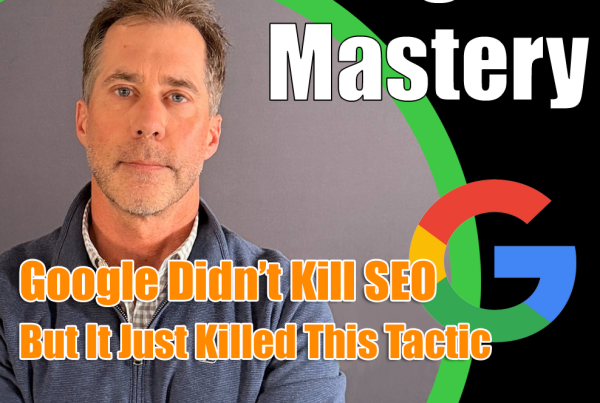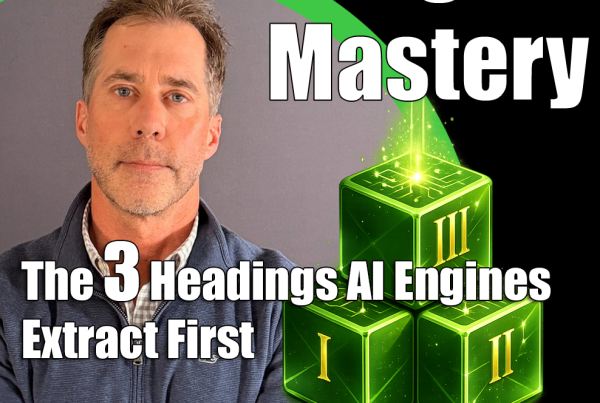Make Your Pages Citation-Ready for AI: The 5-Step Banana Bread Framework
AI engines are no longer grabbing random pages. ChatGPT, Gemini, Perplexity, Claude — they all cite pages that are clear, structured, and trustworthy. Pages with confusing intent, unclear authorship, or weak supporting evidence simply don’t get included in AI answers.
The good news?
Making a page “citation-ready” is easier than you think.
In fact, I can show you the entire framework using something as simple as… my Banana Bread recipe.
This article breaks down the exact 5-step playbook from my latest video. If you want to watch the full walkthrough, you’ll find it here:
👉 https://greenbananaseo.com/ai-search-videos/citation-ready/
What “Citation-Ready” Really Means in AI Search
AI engines need to instantly understand:
-
What the page is about
-
Who created it
-
Why it’s trustworthy
-
How it’s structured
-
Where it fits inside your entity web
If your page makes AI guess, it gets ignored — even if the content is outstanding.
This is why pages with strong structure, verified authorship, and clean schema get cited in AI outputs far more often than long articles with no identity signals.
The 5-Step Citation-Ready Playbook
Using Kevin Roy’s Banana Bread Recipe as the Example
1. Clarify the Page Topic
Your opening paragraph must eliminate ambiguity.
Lead with a clear, unmissable statement about what the page is.
Example from the recipe page:
“This is Kevin Roy’s step-by-step recipe for moist, classic Banana Bread — written for beginners who want a simple, reliable loaf with everyday ingredients.”
That one sentence tells AI:
-
Topic
-
Purpose
-
Format
-
Audience
-
Author
Clarity is a ranking factor in AI search.
2. Identify the Author
AI needs to know who wrote the content.
A real person.
A real identity it can verify across the web.
Add an author line like:
“Recipe by Kevin Roy — home baker and founder of GreenBanana SEO.”
Then connect it to your Author Page:
-
Bio
-
Photo
-
Credentials
-
Social profiles
-
Press
-
Entity connections
Your author page is the anchor point of your entire AEO ecosystem.
3. Add External Supporting Sources
AI trusts pages backed by reputable third-party evidence.
In the Banana Bread example, supporting sources include:
-
USDA baking temperature guidelines
-
A scientific study on banana ripeness and moisture
-
A culinary article comparing baking soda vs. baking powder
These sources don’t just improve credibility for readers — they give AI engines verifiable grounding.
Outside validation increases your chance of being cited.
4. Add Structured Data (Schema)
Schema is a machine-readable blueprint that tells AI exactly what your page contains.
For a recipe page, that includes:
-
Recipe Schema
-
Ingredients
-
Instructions
-
Prep time
-
Cook time
-
Nutrition
-
Difficulty
-
Author markup
-
Images
-
Keywords
For non-recipe pages, the same rule applies:
Use the correct schema to label every important fact.
Schema dramatically increases your visibility in AI search because the model doesn’t have to infer anything — it’s already labeled and explicit.
 5. Connect the Page to Your Entity Web
5. Connect the Page to Your Entity Web
This is the step nearly everyone overlooks — and it’s the most powerful.
At the bottom of the page, link to:
-
Your Author page
-
About page
-
Social profiles
-
Press mentions
-
Related articles
-
Your business (GreenBanana SEO)
These links create a verified identity cluster.
AI engines use these connections to confirm who you are and whether your content is safe, credible, and consistent across the web.
When your identity is consistent, AI trusts your content — and citations follow.
When you apply these five steps, even something as ordinary as a Banana Bread recipe becomes a citation-worthy asset.
Clear topic → Clear author → Supporting evidence → Structure → Entity connections.
This is the new blueprint for AI visibility.
If AI trusts your structure, AI trusts your brand — and it pulls you into the answers instead of your competitors.
Watch the full breakdown video here:
👉 https://greenbananaseo.com/ai-search-videos/citation-ready/
Link to my recipe – https://greenbananaseo.com/kevin-roys-soon-to-be-famous-banana-bread-recipe/
Link to Recipe and Author Schema Example – https://docs.google.com/
Watch this Video about Author Identity on our AI Ranking YouTube Channel!
Author Identity: The Foundation of AEO
Your author presence doesn’t just strengthen trust — it’s the foundation of Answer Engine Optimization (AEO). AI search engines like ChatGPT, Gemini, and Perplexity reward credible entities that consistently demonstrate expertise and authenticity. When your author data is verified and structured, you’re signaling to AI that your content belongs in authoritative results.
Boosting Visibility in ChatGPT
Optimizing for AI visibility starts where most conversations now happen — inside ChatGPT. Through our ChatGPT SEO Agency Services, we help brands ensure their insights, schema, and entities are understood and cited by OpenAI’s ecosystem. If you want your content to appear inside ChatGPT’s answers, building a consistent author identity is step one.
Strengthening Your Authority in Gemini
Google’s Gemini uses its own retrieval and reasoning system to surface high-trust content. That’s why our Gemini SEO Agency Services focus on aligning your site’s topical clusters and author signals with Google’s evolving AI ranking logic. A verified author identity helps Gemini connect your content with your expertise — giving your brand greater visibility across search and AI results.
Expanding Reach in Perplexity
Perplexity.ai combines citation-based retrieval with contextual ranking, making author credibility more important than ever. Our Perplexity SEO Agency Services are designed to position your content for visibility in AI summaries and direct-source citations — where real audience trust is built.
How to Implement Author Schema
To make your author identity machine-readable, you’ll need to implement Author using structured data. This connects your name, role, and verified links (like LinkedIn or media mentions) directly to your published content. Schema helps AI engines understand who you are — and that your expertise is worth citing.
Here is a link to My Author Schema


